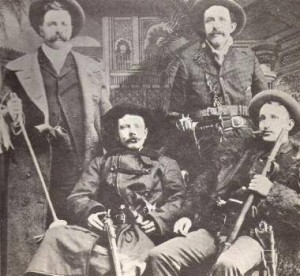This Day in History: The First American Train Robbery

http://thefolklorist.newtv.org/the-reno-gang/
The Reno Gang
October 15, 2018
After the Civil War, America was put into a financial crisis due to a long period of unemployment. The leading affect ended in people breaking the law to find a source of income, which sparked an epidemic of brutal and thieving gang movements. The Reno Gang was a notorious gang at the time that soon would revolutionize the limits of a robbery.
The Reno Gang consisted of four brothers, Frank, John, Simeon, and William Reno who came from a small town in Indiana called Rockford. The four brothers were born between 1837 and 1848. They came from a very religious family that had another brother and a sister. All the Reno brothers were seen as rebels and trouble makers when they were young. When the two older brothers, Frank and John Reno, got into their mid teens, they started out swindling travelers of their money by cheating them in small card games. Soon, the two brothers started robbing small businesses and stealing other people’s horses.
By 1851 the two brothers were looked at as the real deal as they set a bunch of retailers on fire and robbed them. Frank and John were suspected of arson, which sparked the beginning of terror in the Midwest caused by the two Reno Brothers.
By 1866, all four brothers joined the gang, along with some acquaintances as well. The Reno Gang was tired of risking their lives for small robberies, so they began to think outside of the box. The brothers decided to rob a moving train, traveling from Ohio to Mississippi. Their reasoning was that there was no law enforcement guarding moving trains, and it had never been attempted before.
On October 6, they succeeded in stopping and boarding the train. The men were all masked and armed. They held up the train’s teller and made their way to the express car. Their plan worked and the Reno Gang stole 13,000 dollars from the train.
After this major robbery, the Reno Gang successfully robbed two US treasuries of 32,000 dollars, a Missouri courthouse of 23,000 dollars, and lastly, a second train which they robbed of 96,00 dollars. The brothers were eventually caught in 1868 and eventually put to death.
